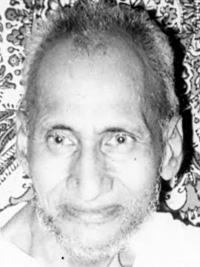33. Samlekhana Sutra
PRECEPTS ON PASSIONLESS DEATHS
Sariramahu nava tti, jivo vuccai navio.
Samsaro annavo vutto, jam taramti mahesino. (567)The body is called a boat, the soul is a boatman, the worldly existence is an ocean which the great sages cross over. (567)
Bahiya uddhamadaya, navakamkhe kayai vi.
Puvvakammakkhayatthae, imam deham samuddhare. (568)He who has an eye on his upward journey (liberation) shoul not think of the external objects (i. e., worldly pleasures): he should protect his body for annihilating the past Karmas. (568)
Dhirena vi mariyavvam, kaurisena vi avassamariyavvam.
Tamha avassamarane, varam khu dhirattane marium. (569)The man possessed of a calm disposition must die, the man possessed of a cowardly disposition too must die; so when death is inevitable in any case, it is better to die possessed of a calm disposition. (569)
Ikkam pamdiyamaranam, chimadai jaisayani bahuyani.
Tam maranam mariyavvam, jena mao summao hoi. (570)One death-of-the-wise-man puts an end to hundreds of births; hence one ought to die such a death as earns one the title well-died. (570)
Ikkam pamdiyamaranam, padivajjai supuriso asambhamto.
Khippam so marananam, kahie amtam anamtanam. (571)A wise person who is free from anxiety dies a peaceful death once; by such death, he immediately puts an end to an infinite number of deaths. (571)
Care payaim parisamkamano, jam kimci pasam iha mannamano.
Labhamtare jiviya vuhaitta, pacca parinnaya malavadhamsi. (572)One ought to undertake every activity with the fear of bondage (i.e., possibilities of bondage) one ought to prolonge one.s life in the hope of acquiring ever new gains in the future and at the end, one ought to destroy one.s defilements with prudence. (572)
Tassa na kappadi bhatta-painnam anuvatthide bhaye purado.
So maranam patthito, hodi hu samannanivvinno. (573)He who has no fear of any kind before him, should not take the vow of desisting from food and water; if he seeks death, he should be treated as disgusted taken even from his monkhood, i.e., fast unto death. (573)
Samlehana ya duviha, abbhimtariya ya bahira ceva.
Abbhimtariya kasae, bahiriya hoi ya sarire. (574)A Sallekhana-i. e., fast-unto-death is of two kinds; interanl and external, internal sallekhana consists in emaciating the passions while the external one consists in emaciating the body. (574)
Kasae payanuem kicca, appahare titikkhae.
Aha bhikkhu gilaejja, aharasseva amtiyam. (575)A monk (adopting the vow of sallekhana) should first subdue his passions and (then) reduce the intake of his food gradually; but when the body becomes extremely weak, he should stop taking any food. (575)
Na vi karanam tanamao samtharo, na vi ya phasuya bhumi.
Appa khalu samtharo, hoi visuddho mano jassa. (576)A person whose mind is pure, needs neither a bed of straw nor a faultless ground; his soul itself becomes his bed. (576)
Na vi tam sattham ca visam ca duppautu vva kunai veyalo.
Jamtam va duppauttam, sappu vva pamaino kuddho.
Jam kunai bhavasallam anuddhiyam uttamtthakalammi.
Dullahabohiyattam, anamtasamsariyattam ca. (577 & 578)Mental thorns (salya) like deceit, perverted attitude and a desire for worldly enjoyments in next life in a person observing the vow of Sallekhana cause him greater pain than a tainted weapon, poison, devil, an evil-motivated amulet or an angry serpent, for in the presence of these salyas right understanding becomes impossible and involvement in an infinite transmigratory cycle becomes inevitable. (577 & 578)
To uddharamti garavarahiya, mulam punabbhavalayanam.
Micchadamsanasallam, mayasallam niyanam ca. (579)A monk who is free from pride cuts down the three roots of rebirth, i.e., the thorns of wrong faith, deceit and desire for worldly enjoyment in next life. (579)
Micchaddamsanaratta, saniyana kanhalesamogadha.
Iya je maramti jiva, tesim dulaha bhave bohi. (580)Hence those persons who die as attached to wrong faith, as full of desire for sensuous enjoyment in return for the good acrts performed, as subject ton krsna lesya (black- colouring) do not find it easy to attain right understanding. (580)
Sammaddamsanaratta, aniyana sukkalesamogadha.
Iya je maramti jiva, tesim sulaha bhave bohi. (581)(On the other hand) those persons who die as attached to right faith, as devoid of desire for sensuous enjoyment in return for the good acts performed, as subject to sukla lesya (white-colouring) find it easy to attain right understanding. (581)
Arahanae kajje, pariyammam savvada vi kayavvam.
Pariyambhabhavidassa hu, suhasajjha rahana hoi. (582)One who is desirous of performing aradhana (the set of auspicious acts to be performed at the time of death) ought to always perform parikarman (practice of the set of auspicious acts): for one whose mind is permeated with prikarman, finds it easy to perform aradhana. (582)
Jaha rayakulapasuo, joggam niccamavi kunai parikammam.
To jidakarano juddhe, kammasamattho bhavissadi hi.
Iya samannam sadhuvi, kunadi niccamavi jogapariyammam.
To jidakarano marane, jjhanasamattho bhavissati. (583 & 584)One who is born in a royal family and performs his (military) exercises regularly will become completent to win all wars: similarly a monk who regularly engages himself in meditation and practise of the vows of monastic life, conquers his mind, and will become competent to practice meditation at his death. (583 & 584)
Mokkhapahe appanam, thavevi tam ceva jhahi tam ceva.
Tattheve vihara niccam, ma viharasu annadavvesu. (585)Fix (your) soul on the path of liberation and meditate on the soul only; always be engrossed in it and not in any other substance. (585)
Ihaparalogasamsa-ppaoga, taha jiyamaranabhogesu.
Vajjijja bhavijja ya, asuham samsaraparinamam. (586)One should give up desire for pleasures in this world as also in thenext; should give up liking either for life or for death or for enjoyments, should engage thought in the evil consequences available in the world of transmigration. (586)
Paradavvado duggai, saddavvado hu suggai hoi.
Iya nau sadavve, kunaha rai virai iyarammi. (587)One gets birth in a miserable state by being devoted to other substances, i.e., worldly things and birth in a good state by being devoted to contemplation of one.s own soul; knowing this one should be absorbed in meditation of one.s soul and desist from thinking of other substances. (587)
 Jinendra Varni
Jinendra Varni

